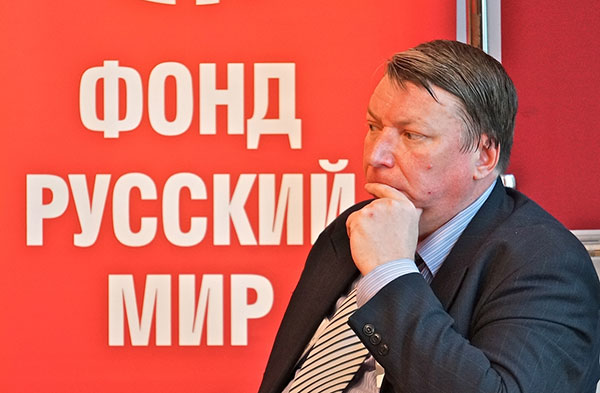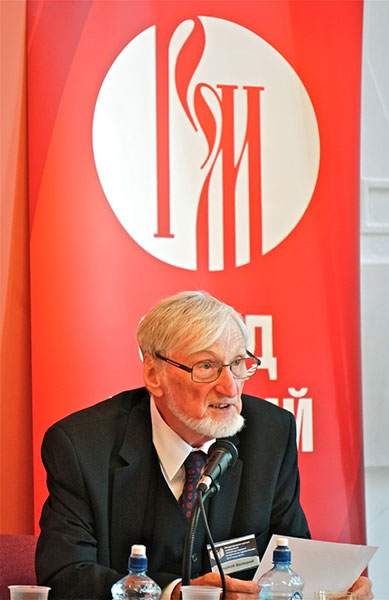
Do We Need Herzen?
/ Главная / Russkiy Mir Foundation / Publications / Do We Need Herzen?Do We Need Herzen?

On June 20-21, the Institute of Philosophy of the Russian Academy of Sciences hosted the international conference “Alexander Herzen and the Historical Fates of Russia,” devoted to the 200th anniversary of the birth of this great Russian thinker and writer. The conference was held at the institute’s historic building on Volkhonka Street with support of the Russkiy Mir Foundation, Russian Humanities Research Fund and the Russian Liberal Heritage Foundation.
The Institute of Philosophy brought together the leading researchers of the life and works of Herzen from Russia and Europe to discuss the topicality of his ideas today. At the plenary meetings of the conference a number of foreign guests delivered speeches and presentations: renowned Polish historian Andrzej Walicki, French literary historian Georges Nivat, editor of the Polish Gazeta Wyborcza Adam Michnik, and Professor Korine Amacher of the University of Geneva.
The first day of the conference focused on discussions of various aspects of Herzen’s philosophy. A presentation by Dr. Igor Patin, Chief Research Fellow at the Institute of Philosophy, addressed the role of the thinker in Russia’s political philosophy traditions. Dr. Patin emphasized the ideas of freedom, humanism and justice in Herzen’s treatises, which remain pertinent today.
Andrzej Walicki spoke of Herzen’s philosophy of freedom, sketching two portraits of the thinker: on the one hand, a liberal apologist for political and civil freedom; and, on the other hand, a defender of society, the principles of collectivism, subordination and even diffusion of the individual in society. Another foreign guest, Professor Korine Amacher, devoted her presentation to Herzen’s place in Russian and Soviet historiography, uncovering a mass of interesting sources which help us take another look at the thinker’s works.
Director of the Institute of Philosophy’s Social and Political Philosophy Department Dr. Alexei Kara-Murza in his report “Alexander Ivanovich Herzen in the Prince Golytsyn House on Volkhonka” (the investigation and trial in 1834-1835) told about how Herzen’s history was tied to building hosting the conference. Chairman of the Investigative Committee Prince Golitsyn in 1834-1835 repeatedly interrogated Herzen in this very building and announced the emperor’s decision to exile him to the city of Perm.

Following the plenary meeting in the historical Red Hall, Director of the Institute of Philosophy Abdusalam Guseinov and Andrzej Walicki presided over an opening ceremony of a memorial plaque honoring the 200th anniversary of Herzen’s birth.
Furthermore, on June 20 two roundtables were held, examining aspects of Herzen’s worldview based on his literary and philosophical works and his interaction with outstanding contemporaries: Boris Chicherin, Timofei Granovsky and others. Renowned film director Andrei Konchalovsky took great interest in the conference discussions, noting the important role played by Russian public thinking in the modern life of Russia.
The conference program for June 21 was largely devoted to the European period of Herzen’s life and works. Professor Georges Nivat opened the plenary meeting with a presentation titled “The figure of a great European: the problem of an expanded homeland. Nivat examined the issue of the homeland and its possible betrayal in Herzen’s work through the prism of two dimensions of liberty: liberty from and liberty to, asking the question of at what moment does a person and a people acquire the right to revolt against their homeland, against a tyrant. Nivat emphasized that for Herzen Europe was important as a revolutionary Europe, as a Europe which achieved breakthroughs to freedom. He tied Herzen’s ideas with Solzhenitsyn’s heritage, drawing parallels between My Past and Thoughts and The Red Wheel.
Adam Michnik in his report “Herzen through the Eyes of a Pole” expressed his regrets that today so little attention is paid to Herzen’s heritage in Poland and in Warsaw no street bears his name. This is all the more lamentable, as for Michnik’s generation the Russian language is the language of freedom, and without Herzen’s thoughts there would not have been that generation of intellectuals, the group of dissidents, emigrants who left Russia. Herzen, according to Michnik, can be considered among those who changed the world, and most importantly he was a man who preached tolerance, humanism and dialogue.
The two presentations where followed by an interesting discussion, with Russian experts on Herzen contributing their thoughts: Dr. Vladimir Kantor (Higher School of Economics), Dr. Mikhail Mikhail Maslin (Moscow State University) and Alexander Pavlov, Ph.D, Political Science (Higher School of Economics). The roundtable of the second day addresses the theme of “Herzen and Europe,” as well as the issue of Russian and European revolutionary thinking in Herzen’s works.
Alexandra Yakovleva
| Tweet |
New publications

 Mikhail Kalatozov, a director who transformed the world of cinematography in many ways, was born 120 years ago. He was a Soviet film official and a propagandist. Above all, he was capable of producing movies that struck viewers with their power and poetic language.
Mikhail Kalatozov, a director who transformed the world of cinematography in many ways, was born 120 years ago. He was a Soviet film official and a propagandist. Above all, he was capable of producing movies that struck viewers with their power and poetic language.  Ukrainian authorities have launched a persecution campaign against the canonical Ukrainian Orthodox Church (UOC), the biggest one in the country's modern history. Over the past year, state sanctions were imposed on clergy representatives, searches were conducted in churches, clergymen were arrested, criminal cases were initiated, the activity of the UOC was banned in various regions of the country, and monasteries and churches were seized.
Ukrainian authorities have launched a persecution campaign against the canonical Ukrainian Orthodox Church (UOC), the biggest one in the country's modern history. Over the past year, state sanctions were imposed on clergy representatives, searches were conducted in churches, clergymen were arrested, criminal cases were initiated, the activity of the UOC was banned in various regions of the country, and monasteries and churches were seized.  When Nektary Kotlyaroff, a fourth-generation Russian Australian and founder of the Russian Orthodox Choir in Sydney, first visited Russia, the first person he spoke to was a cab driver at the airport. Having heard that Nektariy's ancestors left Russia more than 100 years ago, the driver was astonished, "How come you haven't forgotten the Russian language?" Nektary Kotlyaroff repeated his answer in an interview with the Russkiy Mir. His affinity to the Orthodox Church (many of his ancestors and relatives were priests) and the traditions of a large Russian family brought from Russia helped him to preserve the Russian language.
When Nektary Kotlyaroff, a fourth-generation Russian Australian and founder of the Russian Orthodox Choir in Sydney, first visited Russia, the first person he spoke to was a cab driver at the airport. Having heard that Nektariy's ancestors left Russia more than 100 years ago, the driver was astonished, "How come you haven't forgotten the Russian language?" Nektary Kotlyaroff repeated his answer in an interview with the Russkiy Mir. His affinity to the Orthodox Church (many of his ancestors and relatives were priests) and the traditions of a large Russian family brought from Russia helped him to preserve the Russian language.

 The leaders of the Friends of the Great Russia cultural association (Amici Della Grande Russia) in Italy believe that the Western policy of abolishing Russian culture in Europe has finally failed. Furthermore, it was doomed to failure from the beginning.
The leaders of the Friends of the Great Russia cultural association (Amici Della Grande Russia) in Italy believe that the Western policy of abolishing Russian culture in Europe has finally failed. Furthermore, it was doomed to failure from the beginning.  Name of Vladimir Nemirovich-Danchenko is inscribed in the history of Russian theater along with Konstantin Stanislavski, the other founding father of the Moscow Art Theater. Nevertheless, Mr. Nemirovich-Danchenko was a renowned writer, playwright, and theater teacher even before their famous meeting in the Slavic Bazaar restaurant. Furthermore, it was Mr. Nemirovich-Danchenko who came up with the idea of establishing a new "people's" theater believing that the theater could become a "department of public education."
Name of Vladimir Nemirovich-Danchenko is inscribed in the history of Russian theater along with Konstantin Stanislavski, the other founding father of the Moscow Art Theater. Nevertheless, Mr. Nemirovich-Danchenko was a renowned writer, playwright, and theater teacher even before their famous meeting in the Slavic Bazaar restaurant. Furthermore, it was Mr. Nemirovich-Danchenko who came up with the idea of establishing a new "people's" theater believing that the theater could become a "department of public education."  "Russia is a thing of which the intellect cannot conceive..." by Fyodor Tyutchev are famous among Russians at least. December marks the 220th anniversary of the poet's birth. Yet, he never considered poetry to be his life's mission and was preoccupied with matters of a global scale. Mr.Tyutchev fought his war focusing on relations between Russia and the West, the origins of mutual misunderstanding, and the origins of Russophobia. When you read his works today, it feels as though he saw things coming in a crystal ball...
"Russia is a thing of which the intellect cannot conceive..." by Fyodor Tyutchev are famous among Russians at least. December marks the 220th anniversary of the poet's birth. Yet, he never considered poetry to be his life's mission and was preoccupied with matters of a global scale. Mr.Tyutchev fought his war focusing on relations between Russia and the West, the origins of mutual misunderstanding, and the origins of Russophobia. When you read his works today, it feels as though he saw things coming in a crystal ball...